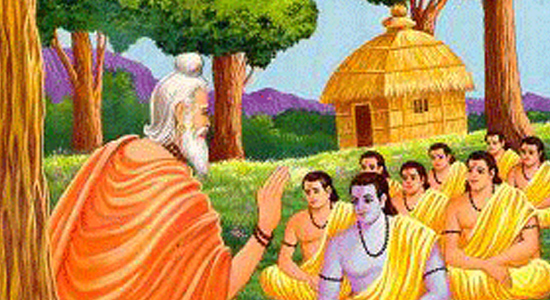Indian philosophy refers to several traditions of philosophical thoughts that originated in India. Indian philosophy is focused on life and the knowledge required to make it better and more meaningful. From a spiritual perspective, there are two streams in Indian Philosophy, first ‘Nastik’ which strongly believes only in materialistic aspects of life without any spiritual association with God and second ‘Aastik’ which is a dominant spiritual association with God. There are several schools of Indian Philosophy out that, Sankhya, Yoga, Nyaya, Vaisheshika, Mimansa and Vedanta are the main schools of Vedic philosophy.
A. Vedic Schools of Indian Philosophy –
- Sankhya – Kapil Muni is said to have propounded this philosophical thought in his work Sankhya Sutra. This is a dualist philosophy with basic elements, Prakriti (Nature) and Purusha (Spirit). Here Prakriti and Purusha are supposed to be completely independent and absolute. Sankhya speaks of these two eternal entities Prakriti and Purusha in the universe, both having no beginning or end. Prakriti has a triad of fundamental attributes Sattva, Rajas, and Tamas. Purush is a spiritual element of Pure Consciousness. According to Sankhya philosophy, one can attain Moksha (salvation) by following the Gyan Marg (the knowledge path). This knowledge can be acquired through Pratyaksha (Perception), Anumana (Inference), and Shabda (Hearing).
- Yoga – It is also a dualistic philosophy propounded by Maharishi Patanjali in his 2nd century B.C. text Yogasutra. It is also called Applied Sankhya. According to this school, Atma (soul) and Parmatma (God) are two different and independent identities. These two can be combined through meditation and physical exercises to attain Moksha (salvation).The important between Sankhya and Yoga school is that the former believes in Gyan (knowledge) as a means to attain Moksha (salvation), and the latter suggests attaining that through Yoga, this could be achieved by restraining the mind, leading an ethical life, combined with a firm belief in the grace of God.
- Nyaya – This philosophical school is based on Nyayasutra a 2nd-century B.C. text authored by Maharishi Gautam. According to Nyaya philosophy, salvation can be attained through knowledge. It emphasizes valid or real knowledge about any object as it exists. This philosophical school considers God as one who creates, sustains, and destroys the universe.
- Vaisheshika – Maharishi Kanaad (कणाद) propounded this philosophy. He also gave the atomic theory. It is a realistic and objective philosophy of the universe. The Vaisheshika school believes that objects of the universe are composed of 5 elements: earth, water, air, fire, and ether. According to this school, these five basic elements combine to give birth to new things. It considers that living beings are rewarded or punished according to the law of karma. Vaisheshika school considers the creation and destruction of the universe to be a cyclic process and occurs according to the wishes of God.
- Mimansa – This philosophy was propounded by Rishi Jaimini and its main text is Jaiminisutra. It is based on the analysis of interpretation, application and use of the text of the Samhita and Brahmana portions of the Vedas. According to this philosophical school, Vedas contain eternal truth. Mimansa lays stress on ritualistic parts of the Vedas.
- Vedanta – This philosophical school was propounded by Adi Shankaracharya. This is also called Vendanta as well as Uttar-Mimansa and refers to the philosophy of Upanishads. Adi-Shankaracharya said that the ultimate reality is Brahma (ब्रह्म). And there is no distinction between self and Brahma. According to this school, Brahama is considered as existent and unchanging highest truth and knowledge. The knowledge of Brahma is the essence of all things and ultimate existence. Vedanta denies the existence of an apparent ego, making Vedanta unique philosophy in the World.
B. Other Philosphical Schools –
- Charvak – This is also called Lokayat. This philosophy was propounded by Charvak in his text Brihaspatyasutra. This is a materialistic, skeptical, and atheistic school of thought. This signifies a person to eat, drink and be marry. According to this philosophy, the aim of human life should be to enjoy all the pleasures of life.
- Buddhism – Buddhism was founded by Gautam Buddha ith century B.C. and it’s a non-theistic belief system. This philosophy considers the question of God as irrelevant thus deviating from some of the beliefs among Hindus yet overlaps with Hinduism because of belief in Karma and Rebirth. Buddhist philosophy suggests a Noble Eightfold Path end suffering, and its philosophical principles are known as the Four Noble Truths.
- Jainism – Jain philosophy was propounded by Mahaveer Swami who was a contemporary of Gautam Buddha. Jainism is much older than Buddhism, yet its central tenets were given by Mahaveer Swami. Jainism insists that only Kevalis, those who have infinite knowledge, can know the true answer. All others would only know a part of the answer. It stresses spiritual independence and the equality of all life and emphasizes n non-violence and posits self-control as vital for attaining the realization of the soul’s true nature. Jainism philosophy also f emphasizes the immediate consequences of one’s behaviour
